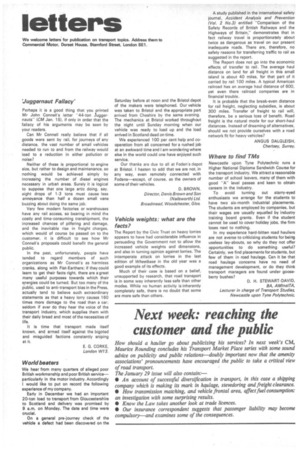'Juggernaut Fallacy' Perhaps it is a good thing that you
Page 34

If you've noticed an error in this article please click here to report it so we can fix it.
printed Mr John Connell's letter "44-ton JuggernautsICM Jan. 151, if only in order that the fallacy of his arguments may be seen by your readers.
Can Mr Connell really believe that if all goods were sent by rail, for journeys of any distance, the vast number of small vehicles needed to run to and from the railway would lead to a reduction in either pollution or noise?
Neither of these is proportional to engine size, but rather to design and maintenance, so nothing would be achieved simply by increasing the number of diesel engines necessary in urban areas. Surely it is logical to suppose that one large artic doing, say, eight drops of 1-3 tons must cause less annoyance than half a dozen small vans buzzing about doing the same job, Very few modern factories or warehouses have any rail access, so bearing in mind the costly and time-consuming transhipment, the increased chances of pilfering and damage. and the inevitable rise in freight charges, which would of course be passed on to the customer, it is difficult to see how Mr Connell's proposals could benefit the general public.
In the past, unfortunately, people have tended to regard members of such organizations as Mr Connell's as harmless cranks, along with Flat-Earthers; if they could learn to get their facts right, there are a great many useful purposes towards which their epergies could be turned. But too many of the public, used to anti-transport bias in the Press. actually tend to believe such extraordinary statements as that a heavy lorry causes 160 times more damage to the road than a car; seldom if ever do they hear the voice of the transport industry, which supplies them with their daily bread and most of the necessities of life.
It is time that transport made itself known, and armed itself against the bigoted and misguided factions constantly sniping at it.
E. G. CORKE, London W13.




































































































